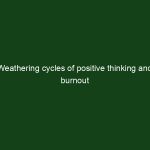In the first day of September children usually go to school after the summer vacation. Many children use the summer vacation to learn on their own, things that have very little to do with their school subjects. Some children learn music or read books, while others swim or shoot hoops. When the vacation is over, …
Unreasonable expectations and struggling families
Our unreasonable expectations quite often do not allow us to be successful and happy. We can see it in many areas of life. Our children are the clearest mirror of our expectations and strange ways they are shaping the reality. Managing expectations is definitely something any responsible adult should strive to master. You can read …
Continue reading “Unreasonable expectations and struggling families”
Rethink your emotions
As the summer is about to end, it may be a good time to get the last moments of the summer vacation and sun and prepare for the next round of learning. For many people, this is an emotional time combining anxiety, anticipation, and pleasure. Many people use the vacation to shake off the stress …
Learning with feelings
Usually, when we discuss learning we address anything but feelings. This can be very convenient if our feelings are tuned with what we learned. When our feelings are in the way of what we learn, we try to activate the willpower and concentrate on more intellectual and technical aspects of learning. Sometimes we would like …
Learning that shapes us
While there is some correlation between the success at school and success in life, this correlation is weak. Even the connection between school grades and research success is not always clear. We can find ourselves in changing roles as a student, a researcher, and a teacher with very different requirements at each stage of our career. …
Minimizing self-sabbotage
We sabbotage ourselves in many ways. Some of the more dangerous things we can do is trying to “hit rock bottom” or attempting a “leap of faith”. This blog is focused on learning, and if we want to learn we need to stay in the game and minimize self-sabbotage. You can read more about the …
Magical thinking and its healing powers
The human mind is strange in many wonderful ways. One of the strangest properties of our mind is the ability to heal the body. We can change the reality by telling a story or visualizing a metaphor. In this article, I try to question the science and the apparent magic of healing. You can further …
How smart people fight compensate negative self image
Not all of us have a positive perception of ourselves. Maybe this is one of the best motivations to take classes in self-improvement. Fortunately, it seems that high IQ can balance off some disadvantages we may have. This is a complex subject, and it certainly deserves several articles on this blog. You can find more …
Continue reading “How smart people fight compensate negative self image”
Six unexpected ways perfectionism makes you less productive
While perfectionism might have been encouraged when I was a child, today we know better. The risks of burnout are evident. There are some other issues which I seldom discuss: the compulsive thought patterns and reduced creativity, being unable to delegate and progress the career ladder, the risk of choosing confrontation over collaboration and reduced socialization, the …
Continue reading “Six unexpected ways perfectionism makes you less productive”
Weathering cycles of positive thinking and burnout
By now, I have been working in the same disciplines for decades. The experience is highlighting previously hidden connections and new patterns start to emerge. One of the things that strike me is the strength and depth of positive thinking and burnout in my own life. I do not want you to repeat my mistakes, …
Continue reading “Weathering cycles of positive thinking and burnout”











